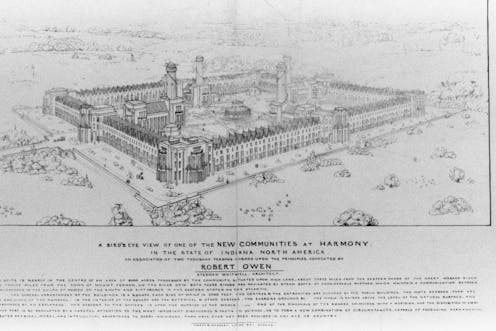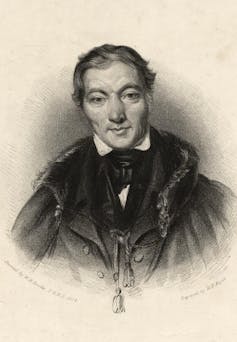Robert Owen, born 250 years ago, tried to use his wealth to perfect humanity in a radically equal so
The wealthy textile manufacturer harbored ambitions that went far beyond the well-being of his own workforce and depleted his fortune.

Do you have a work schedule that leaves you with enough time off the clock to rest up and handle your other responsibilities?
If so, you might owe something to Robert Owen, a wealthy industrialist who was born in Wales on May 14, 1771.

Owen is widely credited with being the first person to advocate for a universal “eight hours labor, eight hours recreation, eight hours rest” approach to work-life balance. He experimented with this concept at his own factories and urged employers everywhere to adopt this management ethos as part of the socialist ideology he embraced decades before Karl Marx.
In the early 19th century, many U.S. and European factory workers worked up to 18 hours a day, six days a week.
Once a year, I travel with 15 fellows enrolled in a leadership program to New Harmony. It’s the site of Owen’s greatest experiment, a “cooperative community” he founded in southern Indiana on the banks of the Wabash River. Far more radical than limiting labor to eight-hour workdays, the utopia Owen envisioned ran up against human nature.
Early success and a socialist vision
Owen, born into a working-class family, had virtually no formal education. By the age of 21, he was managing a textile mill, and at 28 he married the daughter of a Scottish mill owner, whose business he soon purchased. Owen rejected long hours and took steps to make child labor less exploitative. Although he paid higher wages than his competitors, the mill’s profits made him a wealthy man.
Owen believed in lifelong education, establishing an Institute for the Formation of Character and School for Children that focused less on job skills than on becoming a better person. This innovation attracted considerable attention, and many dignitaries – including the future czar of Russia – visited to see it for themselves.
But Owen’s ambitions went far beyond the well-being of his workforce.
He conceived of socialist communities of people who would live together, as well as collectively prepare and eat their meals. Children would remain with their families until age 3, at which point the community would take over raising and educating them. Men and women would have equal rights.
At the core of Owen’s philosophy was an earnest question: Why shouldn’t people who work together enjoy the fruits of their labor communally, promoting “the well-being and happiness of every man, woman, and child, without regard to class, sect, party, country, or colour?”
There’s a long-running debate over whether nature or nurture is the biggest factor shaping human character. Owen firmly sided with nurture. He believed in a concept then called “human perfectibility.” In his view, all that was necessary to create better human beings was to raise, educate and employ them in better circumstances.
Creating New Harmony
Owen sought to demonstrate the viability of his ideals by establishing a new community in the United States that would adhere to them. His aspirations belonged to a broader utopian movement that included the Fruitlands agrarian commune in Massachusetts and the Oneida community in New York state.
Other Europeans had attempted their own real-life experiments. In fact, a German religious sect that emphasized a communal way of life was selling its southern Indiana town of Harmony, and its residents were relocating to Pennsylvania.
Owen purchased it in 1825 for US$150,000 (the equivalent of about $4 million today) and renamed it New Harmony. He invited “any and all” to come join his “community of equality” located halfway between St. Louis, Missouri, and Louisville, Kentucky.
New Harmony attracted about 1,000 newcomers, including scientists, naturalists, educators and artists, all eager to build what Owen called a “union and cooperation of all for the benefit of each.”
Trouble soon began to brew.
For one thing, Owen himself seems to have taken a greater interest in traveling and promoting his ideas than in securing the success of the new venture.
A second problem was who moved there. Some residents sincerely believed in Owen’s ideas, while others had been lured by the promise of an easy life and did little to promote the community.
Finally, his reforms proved to be at odds with human nature. Few families wanted their children to be shielded from what he called the “negative influence” of their parents, and people who worked hard resented those who contributed little.
Ahead of his time
Despite considerable investments that depleted Owen’s fortune, the community failed economically after just two years. Perhaps he had overestimated the malleability of human nature. Owen personally believed that humanity wasn’t yet ready for his radical new ideas.

He returned to Europe, where he continued to promote publicly funded education, better working conditions and his vision of an enlightened society. He died in Wales in 1858. His four sons and one of his daughters remained in New Harmony, leading notable lives of their own.
Owen’s legacy doesn’t just live on in the nine-to-five schedules that became the norm starting in the early 20th century. It’s also in the broad notion of social welfare behind everything from public schools to paid sick leave – including the expansion of government benefits the Biden administration is proposing.
Visitors to New Harmony, where about 750 people reside today, can wander around its many historical sites and learn about its one-time owner and most famous resident, who devoted his fortune and his life to improving the human condition.
[Insight, in your inbox each day. You can get it with The Conversation’s email newsletter.]
Richard Gunderman does not work for, consult, own shares in or receive funding from any company or organization that would benefit from this article, and has disclosed no relevant affiliations beyond their academic appointment.
Read These Next
Do special election results spell doom for Republicans in 2026?
Special election results have anticipated recent midterm outcomes. With Democrats now overperforming,…
OpenAI has deleted the word ‘safely’ from its mission – and its new structure is a test for whether
OpenAI’s restructuring may serve as a test case for how society oversees the work of organizations…
FDA rejects Moderna’s mRNA flu vaccine application - for reasons with no basis in the law
The move signals an escalation in the agency’s efforts to interfere with established procedures for…






